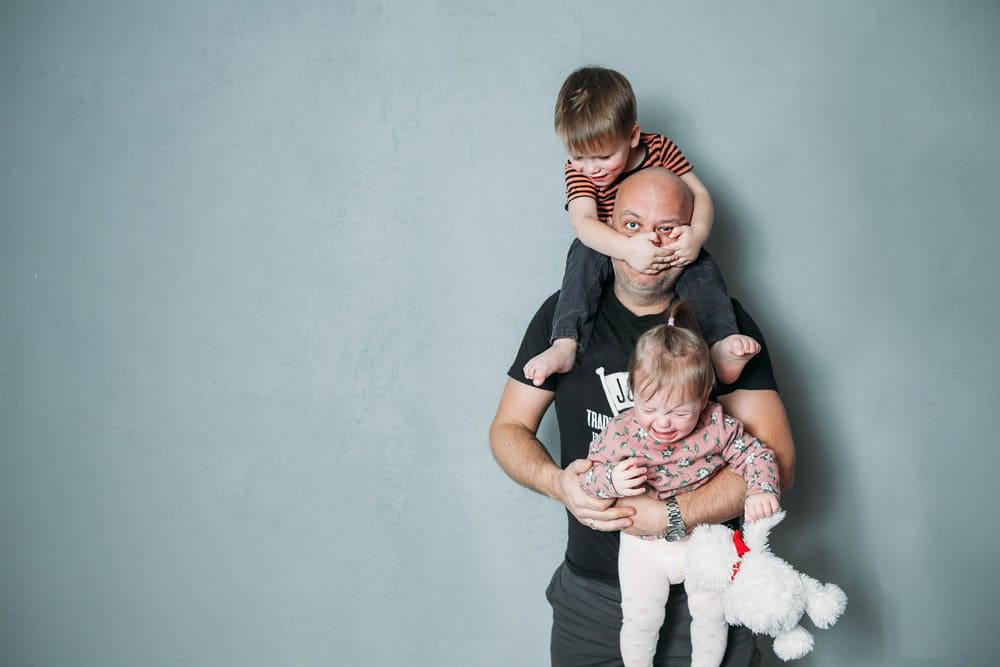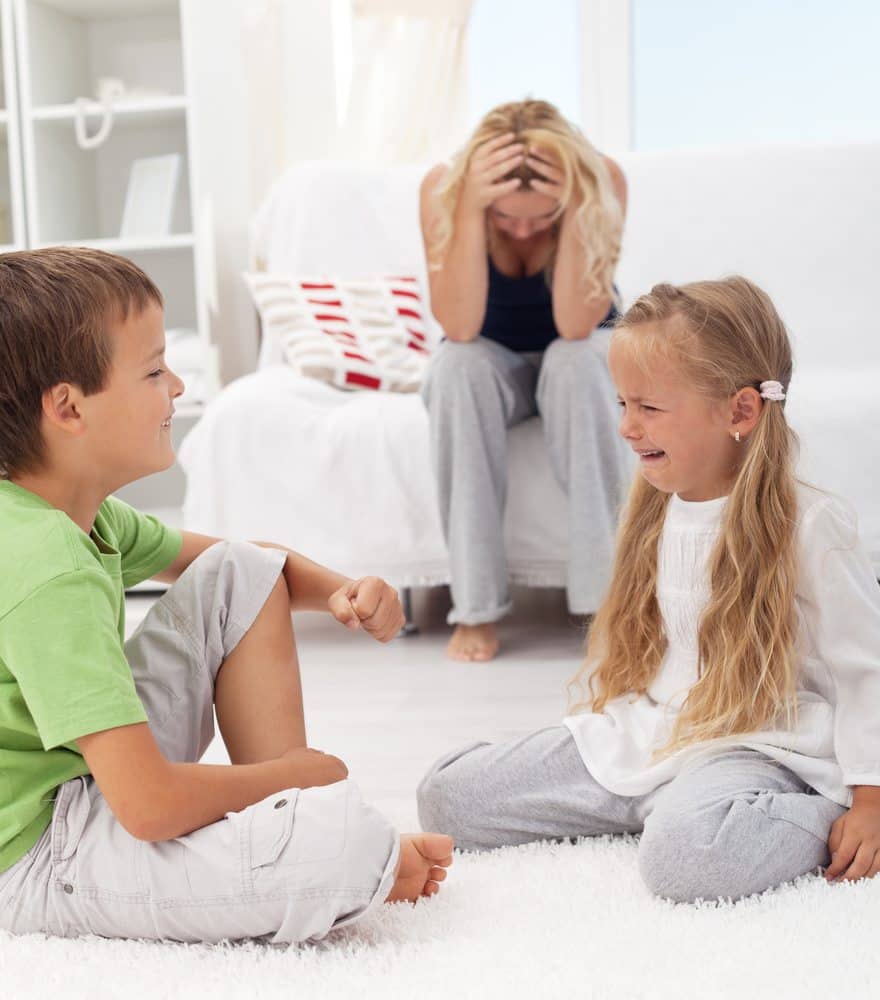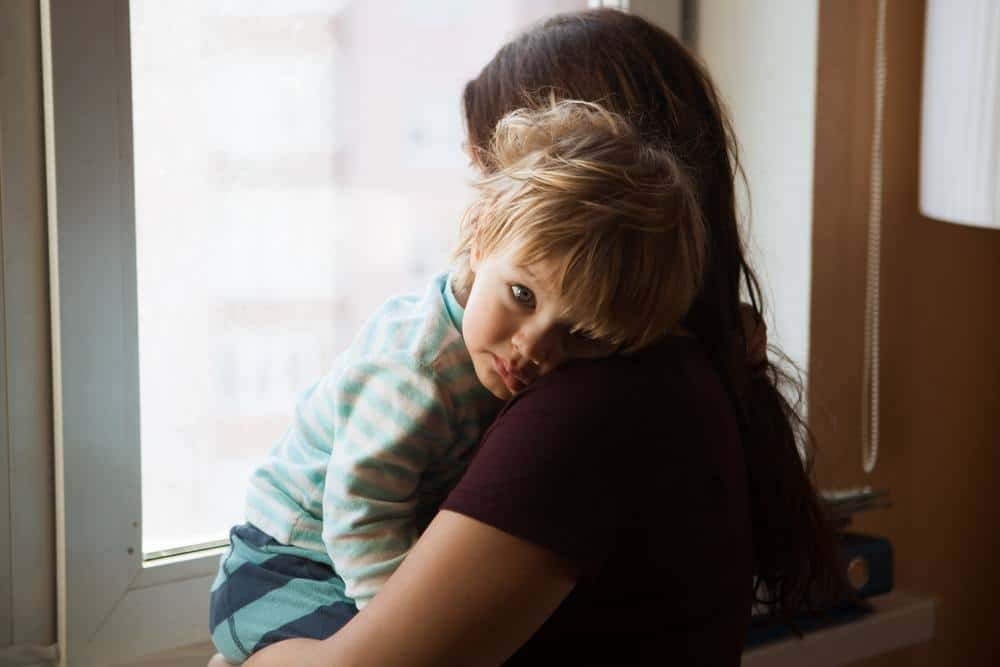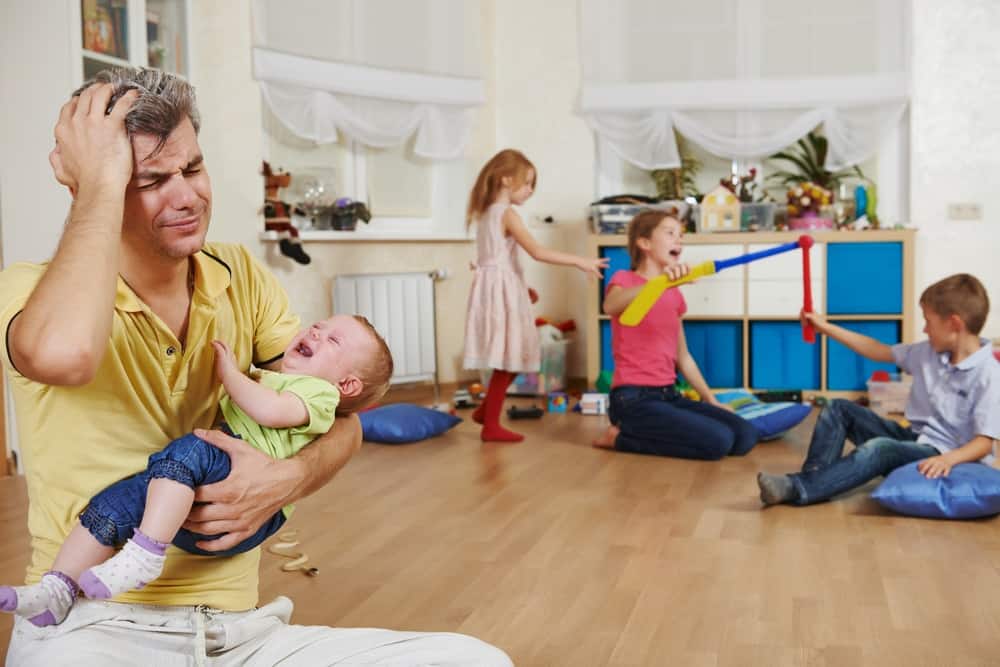Let’s be honest. There’s no such thing as the perfect parent, and striving for perfection only sets yourself up for failure.
Parents are human and humans make mistakes. Sometimes we let our emotions get the better of us.
Our capacity to cope with stressful situations is influenced by our early childhood experiences (how we were parented), our life experiences and situational factors such as whether we’ve had a decent night’s sleep (for most parents, this is hardly ever!).
Parents, just like any human, are emotional beings and sometimes we yell, give in to unreasonable demands or just completely shut down.
And that’s okay.
All that matters to your child is that you do a good enough job. [1, 2]
I’m certainly not condoning abusive or neglectful parental behavior. Quite simply, it’s okay to do a crappy job sometimes. That’s part of being a parent. What’s more important is that you learn from your mistakes. You reflect on what you do well, and what you don’t do so well.
You take steps forward to do a better job next time, without getting bogged down in guilt. If you continually doubt yourself and have low self-esteem this will impact the quality of your relationship with your child (and impact their self-esteem too).
Good enough parenting is one of the key principles of the Circle of Security (COS) Parenting Program, which I will explain in more detail in this article. [1, 2]
Using the Circle of Security (COS) Parenting Program, I will explore ways you can reflect on your relationship with your child, get a better handle on your emotions, and improve your self-esteem and how you see yourself as a parent. [1]
We’ll look at how you can feel like you are doing a good enough job at parenting.
[pullquote align=”normal”]Key Points:
- Permit yourself to be good enough
- Reflection is the key[/pullquote]
Table of Contents
What is Circle of Security?
The Circle of Security Program is a relationship-based parenting education program that integrates over 50 years of early childhood and attachment research. The program was founded by psychologists Kent Hoffman, Glen Cooper, and Bert Powell to help support parents to be what their children really need: a good enough parent.
COS is based on the premise that we are born into this world hardwired to connect with others. This means that we have an innate (biological) need for a secure relationship with our primary caregiver. A child with a secure attachment is likely to have healthy self-esteem and have more success in school, career, and relationships.
The COS program focuses heavily on the concept of ‘good enough parenting’ which is based on the following three principles:
- Do the best you can as a parent
- There is no such thing as perfect
- It’s okay to make mistakes
When you have a better understanding of your parenting practices, you will have more control over the way you parent and this is very rewarding. [1, 2, 3]
[pullquote align=”normal”]
Key Points:
- There is no such thing as a perfect parent
- It’s okay to make mistakes[/pullquote]

How do you feel about your parenting?
If you’re feeling low about your parenting, then you may also feel low about other aspects of your life, like your employment or relationships.
Use these self-reflection questions to consider how you currently feel about your role as a parent:
- How do you see yourself as a parent?
- Are there aspects you wish you could do better?
- Are there parts where you feel you’re doing a good job?
- How would you describe your relationship with your child?
- How would your child describe you?

Do you have low self-esteem?
If you have low self-esteem, then it will likely impact your ability to parent effectively. You may find you lack the confidence to make decisions, or second-guess whether you’re doing things the right way for your child.
The Rosenberg Self-esteem Scale (RSE, 1965) is one of the original and most widely used measures of self-esteem. Suitable for adults and adolescents, it is simple to complete and consists of just ten self-rated, scaled opinion statements. [5]
Use this test to measure and reflect on your own level of self-esteem.
The scale can be completed and scored here: https://www.wwnorton.com/college/psych/psychsci/media/rosenberg.htm
A score below 15 is suggestive of low self-esteem. [6]
Causes of low self-esteem
Low self-esteem is where you have negative thoughts and feelings about yourself. These usually stem from negative life experiences such as:
- Childhood abuse/ neglect
- A parent(s) who were highly critical of you
- You were rejected by a parent(s)
- Your parents were overprotective
- Stressful life experiences in adolescence or adulthood
Negative experiences in childhood can be the foundation for negative core beliefs which are associated with low self-esteem.
Common negative beliefs
Core beliefs are internal “I” statements that we make on an unconscious level because of our past experiences. Negative core beliefs may include:
- I am unworthy
- I am unlovable
- I am unwanted
- I don’t belong
- I am powerless
- I am nothing
- I am not real
- I am defective
- I am worthless
- I am unsafe
- I am not whole
Do any of these seem familiar to you?
All of these have a common theme, the feeling that “I am not good enough.”
Choose one of these that you most relate with and reflect on when you began to believe this statement. What was happening in your life at the time?
What experiences may have reinforced the belief? [4, 5]
Impact of negative parenting practices
If you have low self-esteem, it can lead to lack of confidence in parenting and negative parenting practices, or feeling bad about the way you parent.
Negative parenting practices such as low parental approval or acceptance have a negative impact on your developing child’s self-esteem. [4, 5]
Mean, Weak or Gone?
According to COS, there are three unhelpful parenting styles that are detrimental to children; mean, weak and gone.
- Mean: This is where a parent believes a child must be punished for being disobedient. For example: yelling, using threats, put-downs and/or physical punishment. Often the parent has a strong emotional reaction to the behavior, and usually, they understand that being ‘mean’ to their child is problematic. The research is clear that a relationship where a child fears their primary caregiver does not build a secure attachment.
- Weak: On the other end of the spectrum, parents who are ‘weak’ are just as frightening to their child. Children need routine, structure, and boundaries. If no one is in charge, then it is a frightening world for a child. For example, if a parent feels scared when a child shows a big emotion and does not support them to manage their feeling, then it means that the child learns to deal with emotions on their own.
- Gone: This does not refer to parents who go to work or have short periods of planned absences due to illness, etc. This refers to parents who use alcohol, drugs or choose romantic partners over their child’s needs. When a parent is ‘gone,’ they are emotionally unavailable to their child.

In reality, we all lean toward one of these parenting styles when we’re feeling overwhelmed or stressed. It’s not a black and white picture of parenting; it’s a continuum.
You may find you become ‘mean’ when your child is angry, or ‘weak’ when your child is distressed in the middle of a supermarket. Or maybe you completely zone out when your child is distressed, and you end up being ‘gone.’
So what about you? Do you tend to be mean, weak or gone?
So what do children really need from their parents? They need parents to be bigger, stronger, wiser and kind. We’ll explore this concept in more detail soon. [1, 2, 3]
How to be a ‘good enough’ parent
Rather than further embedding those negative core beliefs, a good enough parent uses honesty and non-judgment to examine where they are at on their parenting journey. You can do this too with the following six steps.
1. Acknowledge Your Past Experiences [1]
The foundations of parenting begin in the way we were parented. [1] Have you ever found yourself doing or saying things just as your own parents or caregivers did? Were you adamant you wanted to do things differently to the way your parents did them, but find yourself falling into the same old patterns?
Much of what we learn about parenting we learned from being parented ourselves. We learn how to parent in the hundreds of daily interactions between parent and child. For example, being hugged, or encouraged to explore, or having a routine.
Perhaps you’re thinking, there are definitely things you don’t want to pass on to your child. Well, you’re not alone. Most individuals and couples who become parents have an idea of what they do and don’t like about their own childhoods and how they’d like to parent their own child. Sometimes that desire is not so easy to put into action.

COS allows parents to reflect on your own upbringing and make choices about how you want to parent.
The first step in supporting your child’s emotional development is to be honest with how well or not well you manage emotions in general.
Take a moment to reflect on these primary emotions and how well you feel your parents were able to support you with each. You may wish to do the exercise separately for each of the main caregivers (parents, grandparents, foster carers) who influenced your life.
As an example, let’s look at anger. When you felt angry as a child, how did your parents respond? Did your father get angry back? Did your mother leave the room? Or did one of your parents help you find ways to process, understand and move on from your anger?
| Emotion | Fully supported | Partially supported | Not at all supported |
| Curiosity | |||
| Joy | |||
| Sadness | |||
| Fear | |||
| Anger | |||
| Shame |
Remember, the point of this exercise is not to judge your own parents; it’s merely to understand how your emotional experiences were supported as a child to help you understand some of the difficulties you now may experience as a parent.
Some people find doing this exercise confronting, or even distressing. If that’s how you feel, then I encourage you to talk about it with a trusted friend, family member or a professional.
[pullquote align=”normal”]Key Points:
- We learned to be parents from our parents
- Through reflection, you can choose to parent differently
- Reflect on how your parents handled your emotions as a child [/pullquote]
2. Know your triggers
Now that you’ve taken the time to think about how your emotions were supported/ not supported as a child, can you identify any feelings that you struggle to help your child with? For example, anger, sadness, etc.
How do you respond when your child has a big emotion? Do you think it’s helpful/ unhelpful?
In Circle of Security (COS), this is known as ‘shark music.’ I will explain further.
When your child has an emotion that creates uneasiness within you, it’s a sign you’re being triggered. It’s a warning sign that you are getting close to the memory or issue regarding that emotional experience within yourself.
You may have learned in childhood that particular emotion wasn’t safe, and probably for good reason (children are highly adaptive!).
This is normal. We all have some difficulties with emotions, but being aware of them is so helpful for your child. In the moment, if you can recognize that uneasiness and pause to examine it, you can keep from falling back on your habitual response.
If you say to yourself, okay my child is feeling angry, and now I’m feeling angry (and that’s because my parents always responded to anger with anger!), then you can see objectively that your emotional reaction is not really to do with your child, but your own past experiences.
Once you have that knowledge, you can CHOOSE how you want to respond.
COS has a great video that explains this concept in more detail here. [1]
[pullquote align=”normal”]Key Points:
- Examine the emotions in your child that make you feel uneasy
- Consider how you respond to these emotions
- Consider how you’d like to respond[/pullquote]
3. Support your child’s emotions (even when you find it difficult – here’s how)
A secure attachment begins with a solid foundation between parent and child where feelings can be shared. It not only builds their self-esteem, but it teaches them how to manage their emotions within a relationship.
COS teaches the concept of ‘being with.’ This means staying with your child when they have a difficult emotion and supporting them. Now, being with is not a technique, but a state of mind. When you have empathy for your child in their emotions, they will learn how to be empathetic toward others.
What’s it like to have someone ‘be with’ you when you’re feeling upset? Have you ever had someone try to talk you out of your feelings? For example, “cheer up” or “you’ll be right.” How has that made you feel?
What is it like to be with your child? Have you ever tried to talk your child out of their feelings or distract them? In COS, it promotes ‘being with’ your child through their distress, so they find their own way out.

Of course, distraction does have its place, but it shouldn’t the primary technique for managing your child’s distress.
Being with is extremely difficult to do if you have little experience of someone being with you in one or more of your emotions. Perhaps your mother always put you down when you showed signs of joy, or, when you were distressed, your father said to stop being a crybaby.
These moments have a significant impact on children and how they learn to survive. We carry these experiences into adulthood. But when you develop an awareness of them, you can make choices and respond differently, even when it feels uncomfortable.
If you find being with difficult, it may be useful to engage a professional to help you work through your past experiences and be more in control of how you deal with emotions in relationships. [1]
[pullquote align=”normal”]Key Points:
- If you show your child empathy, then they will learn to be empathetic to others
- ‘Being with’ your child helps build a secure attachment
- Get professional support if you struggle with your emotions[/pullquote]
4. Be bigger, stronger, wiser and kind
Earlier I mentioned how negative parenting styles such as mean, weak and gone are detrimental to children’s emotional development. COS encourages parents to strive for being bigger, stronger, wiser and kind.
This is a parenting style that reflects a caregiver providing warmth, affection, and kindness, in conjunction with having a strong sense of being in charge. Being firm but kind. Children need boundaries and social rules, but they can be done in an empathetic way.
For example. “I know you really want a biscuit before dinner, and you’re disappointed that I’ve said no. But dinner will be ready in fifteen minutes, and I don’t want you to fill up your belly.”
In this statement, the parent acknowledges the child’s feeling of disappointment and shows empathy, but also sets a clear rule and explains why in a simple way.
Children who experience bigger, stronger, wiser, kind parents tend to be more independent and have good self-esteem. [1, 3]
[pullquote align=”normal”]Key Points:
- Be bigger, stronger, wiser and kind
- Children need boundaries and empathy
- Be firm but kind[/pullquote]
5. Reflect daily
As mentioned earlier, reflection is the key to good enough parenting. So, what is reflection?
“The ability to stand back, observe, and understand one’s own behavior, motivation, and needs and to observe and understand the behavior, motivation, and needs of others; the ability to “turn one’s self in.” [3]

This simply means, taking a step back and examining your thoughts, feelings and actions, and how your thoughts, feelings, and actions impact others. If you’ve had a bad day with your child, then talk to a friend, partner or professional about it. You could also write down your thoughts in a journal.
Be honest with what you did well and what you didn’t do so well. How would you have liked to respond if you were faced with the same situation? What steps can you take to do things differently next time?
Try not to focus too much on the mistakes, but on what you can do better next time. [1, 2]
[pullquote align=”normal”]Key Points:
- Observe and understand your own thoughts, feelings, behavior
- Examine areas of parenting where you’d like to do better
- Talk to someone about it and work through your concerns[/pullquote]
6. Get professional help
There’s no manual for parenting, but you don’t have to try and figure it all out alone. Some parents haven’t learned the skills to regulate their emotions (because of negative life experiences) adequately and need professional support.
If you’re feeling overwhelmed with the demands of parenting, feeling concerned about your mood or behavior, or simply want to find ways to improve your relationship with your child, then professional help can be a useful tool. Talk to your GP or a psychologist about how you’re feeling.
[pullquote align=”normal”]Key Points:
- It’s okay to seek help[/pullquote]
Summary
These are not easy strategies you can put into place immediately and see instant results. The Circle of Security program helps parents to form a mindset of continual reflection to improve your relationship with your child (and other relationships too).
Undergoing these steps is best done with support from a professional who can be your secure base and provide you with a safe space from which to explore your past experiences. This can help you make positive changes in your present-day relationships, especially with your child.
You can improve your self-esteem and the way you feel about parenting. This will have a BIG impact on your relationship with your child.
If you enjoyed learning about some of the Circle of Security concepts and techniques, you can find out more about the program and find a local facilitator through the COS website.
References
- Cooper, G., Hoffman, K., & Powell, B. (2009) Circle of Security Facilitator Manual.
- Cooper, G., Hoffman, K., Marvin, R., & Powell, B. (2000) Treatment assumptions.
- Cooper, G., Hoffman, K., Marvin, R., & Powell, B. (2001) Circle of Security/ Attachment Theory Terminology.
- Mann, M., Hosman., C.M.H., Schaalma, H.P., & de Vries, N.K. (2004). Self-esteem in a broad-spectrum approach for mental health promotion. Health Education Research, 19 (4), 357-372.
- Emler, N. (2001). Self-Esteem: The costs and causes of low self-worth. Youth Studies Australia.
- Rosenberg, M. (1965). Society and the adolescent self-image. Princeton, NJ: Princeton University Press.










